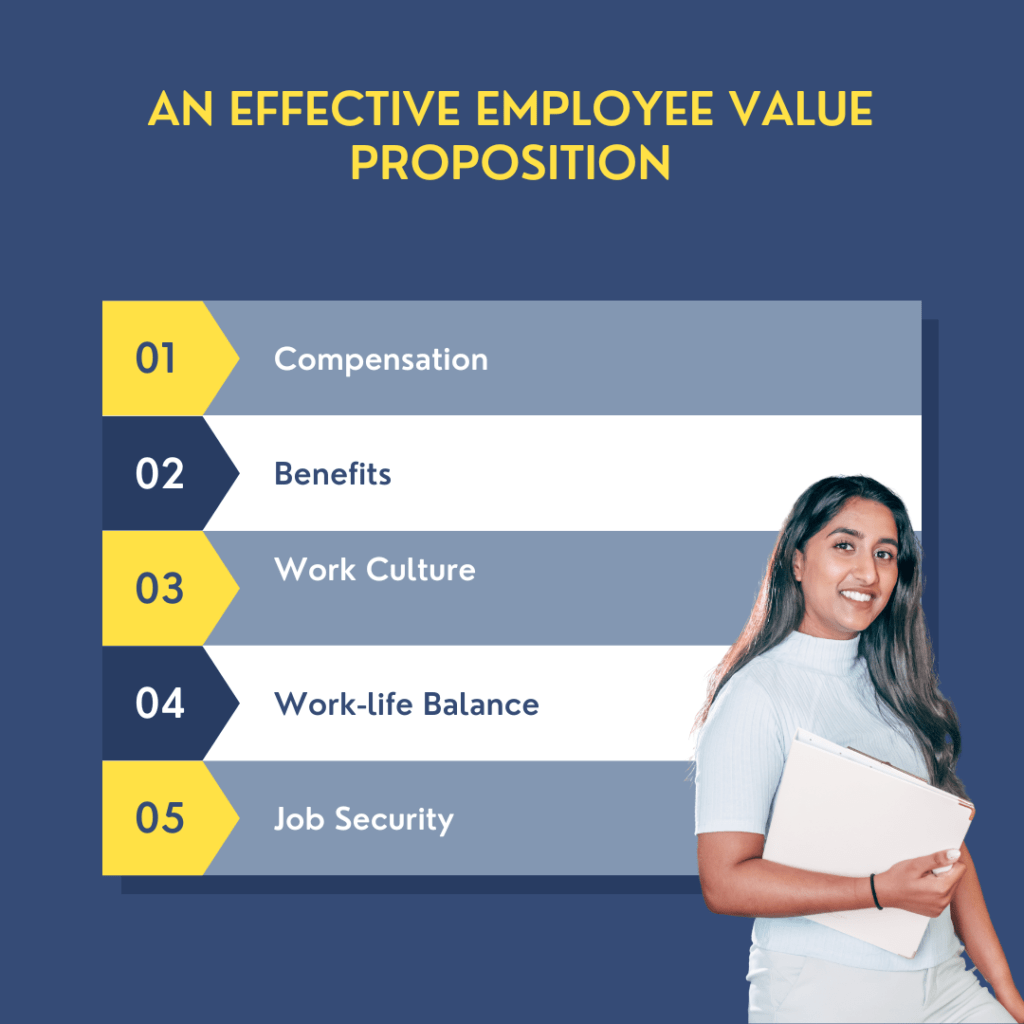An Employee Value Proposition (EVP) is a set of benefits and opportunities provided by an employer to attract and retain talent for the organization. It covers a wide range of elements, including compensation, benefits, work culture, work-life balance, and job security. In this blog post, we will explore each of these elements in more detail and discuss how they contribute to an effective Employee Value Proposition.

Work Culture:
Work culture refers to the overall environment and values of an organization. A positive work culture is one that values employee engagement, employee collaboration, and promotes employees personal development. Employers should foster a culture of open communication, mutual respect, and teamwork, as well as provide opportunities for employees to grow and advance in their careers. A positive work culture can lead to increased employee satisfaction and engagement, which in turn can lead to higher productivity and retention rate.
Compensation:
Compensation is one of the most vital elements of an EVP, as it is directly linked to an employee’s financial well-being. Employers need to offer competitive salaries, bonuses, and other forms of financial incentives to pull and retain top talent. In addition, employers should also consider offering non-financial incentives, such as stock options or profit-sharing plans, to align the interests of employees with those of the company.
Benefits:
In addition to compensation, employers should also offer a comprehensive benefits package to employees. This may include health, dental, and vision insurance, retirement plans, paid time off, and other forms of leave, such as maternity and paternity leave, and flexible work arrangements. The availability of these benefits can be a major factor in an employee’s decision to join or stay with a company.
Work-Life Balance:
Work-life balance is becoming increasingly important to employees, as it allows them to balance their personal and professional responsibilities. Employers should offer flexible work shifts, such as telecommuting and flexible schedules, to help employees achieve a better balance between work and home. Additionally, employers should also provide employees with opportunities to take time off, such as paid vacation and sick leave, to recharge and spend time with their families.
Job Security:
Though offering full job security is not possible in today’s world, however, an employer should strive to offer stable employment terms to their employees. Job security is another crucial aspect of an EVP, as it provides employees with a sense of stability and security. Employers can provide job security by offering long-term employment contracts and opportunities for advancement, as well as investing in training and development programs to help employees grow and advance in their careers. Additionally, employers should also be transparent about the company’s financial health, and communicate any potential layoffs or downsizing well in advance.

Conclusion
In conclusion, an impactful Employee Value Proposition (EVP) is essential for attracting and retaining top talent. It encompasses a wide range of elements, including compensation, benefits, work culture, work-life balance, and job security. Employers should strive to create an environment that values employee engagement, collaboration, and personal development, and provides opportunities for employees to grow and advance in their careers. By offering competitive compensation, comprehensive benefits, and a positive work culture, employers can create an EVP that will help them attract and retain the best talent.





Leave a Reply